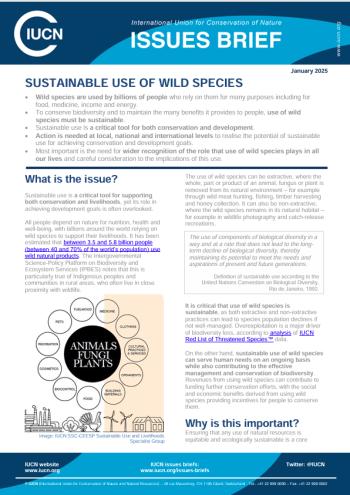

Biodiversity, particularly the biodiversity of Member States of the Southern African Development Community (SADC), is gaining increased recognition for its contribution to economic and sustainable development of the individual Member States and the region as a whole. The SADC Members States have set aside large tracts of forests, wildlife and wetlands as protected areas, to conserve and protect these valuable biodiversity resources.
Although the SADC region is richly endowed with natural resources, it is also characterised by high levels of poverty. Many of the people of the Member States are directly dependent on the rich biodiversity for survival and to sustain their livelihoods, particularly in the rural areas of the region. The biodiversity of the region also contributes to local human health and wellbeing through the provision of clean air, potable water, medicinal plants and food, and providing crucial resources for the sustainable socio-economic development of the region.
The ability of the Member States to sustainably utilise natural resources and effectively protect the environment through the sustainable use, development, manufacturing, and marketing of the exceptional biodiversity resources of the region, particularly wildlife resources, can support the SADC region in achieving their social and economic imperatives of improved quality of life, job creation, local business growth and development, inclusive economies, and poverty reduction. Strategic interventions for the sustainable use of biological resources, while ensuring conservation of these resources, can also facilitate gender mainstreaming in the biodiversity sector and the strengthening of historical, social and cultural affinities within the region.
Southern African Development Community (SADC) TFCA Programme 2023-2033, Gaborone, Botswana
We support the free flow of information. Please share:
Form coming soon
Related Content
-

-

Review of African Social and Economic Development Volume 1
ByIbrahim Bàbátúndé Anobaarrow_forward2024 -

Economic Analysis: Climate Change and Wildlife Utilization on Private Land
ByJackson OtienoEdwin Muchapondwaarrow_forward2015
Get updates by email
Through impactful research, stakeholder engagement, and professional development, AWEI is supporting the wildlife economy across Africa. Please subscribe for occasional updates on our work and forthcoming events.
Sign up for a quarterly dose of AWEI insights
In a complex and changing world, AWEI generates strategic ideas, conducts independent analysis on wildlife economies, and collaborates with global scholar-practitioners to provide training and expertise for biodiversity conservation, climate resilience, and inclusive economic opportunities in Africa.
